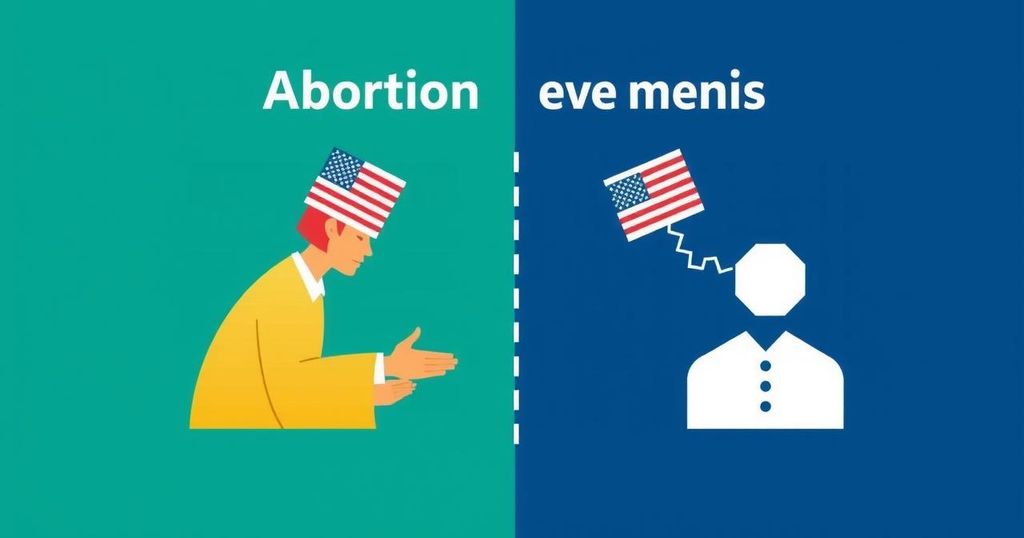Voters face competing measures on abortion and elections as the 2024 presidential election nears. Former President Trump seeks a decisive victory to counter electoral fraud concerns. A rise in election litigation, primarily initiated by Republicans, forecasts a contentious post-election environment, with existing doubts about election integrity threatening to complicate the electoral process and affect public trust in democratic governance.
As the 2024 election approaches, voters are grappling with multiple ballot measures related to abortion and electoral processes. A contentious atmosphere is forecasted, particularly surrounding the aftermath of the election results. Former President Donald Trump has expressed a desire for a substantial victory to counter concerns of electoral fraud, stating, “We want a landslide. We can’t let anything happen”. Both Republicans and Democrats are bracing for possible protracted disputes regarding the election outcomes, with numerous lawsuits already anticipated. The current landscape includes challenges to mail-in voting, overseas ballots, and claims of voter eligibility. Election denialism has become more organized since the 2020 election, raising concerns about the willingness of some election officials to certify results deemed legitimate by courts. This election cycle is characterized by an unprecedented level of litigation regarding election outcomes, which has surged since 2000. Legal battles are not only fought in courts but have also become a strategic play within campaigns, with organizations actively fundraising to support litigation efforts as a method of political messaging. Recent data indicates that approximately 180 election-related cases have been filed this year alone, exemplifying the growing trend. Trump’s narrative regarding the legitimacy of elections remains prevalent within his party, despite evidence to the contrary. Additionally, the Republican National Committee (RNC) has asserted its commitment to election integrity by assembling a large contingent of volunteers and legal resources in battleground states. However, many ongoing legal matters may not reach resolution prior to Election Day, leading to further disputes post-election. Indeed, significant attention will be placed on the mechanics of vote certification, particularly in light of recent legislative changes designed to expedite processes involving contested outcomes. Court rulings, such as that in Georgia which negated certain election rules, exemplify the ongoing struggles over electoral governance. Although there is no legitimate method for failing to certify election results, attempts to do so can engender chaos and delay, impacting voters and election officials alike. The situation underscores the volatile nature of American electoral politics, with litigation and accusations of fraud becoming commonplace, widely complicating the electoral process and potentially undermining public confidence in democratic processes.
As the 2024 presidential election approaches, concerns regarding election integrity have intensified, particularly in the aftermath of the contentious 2020 election and former President Donald Trump’s unfounded claims of widespread voter fraud. This election cycle is marked by a significant uptick in litigation related to voting processes and regulations, reflecting a broader trend in partisan battles over electoral laws. The Republican National Committee has mobilized substantial resources to address perceived threats to election integrity, raising the stakes for both major political parties. Furthermore, procedural changes instituted by the Electoral Count Reform Act aim to facilitate the handling of disputes arising from election certifications. The evolving landscape of election-related litigation is fostered by evolving strategies employed by both parties, underlining the complexity and significance of the upcoming election.
The upcoming 2024 presidential election stands to be shaped by a multitude of factors, notably competing ballot measures on abortion and elections, a significant surge in electoral litigation, and the resonating influence of past electoral disputes. The Republican and Democratic parties are poised for a potentially fierce battle over election outcomes, further exacerbated by existing distrust and accusations surrounding voting integrity. This unprecedented environment necessitates careful scrutiny of both the electoral processes and the judiciary’s role, as the nation navigates through a remarkably complex electoral landscape.
Original Source: apnews.com






